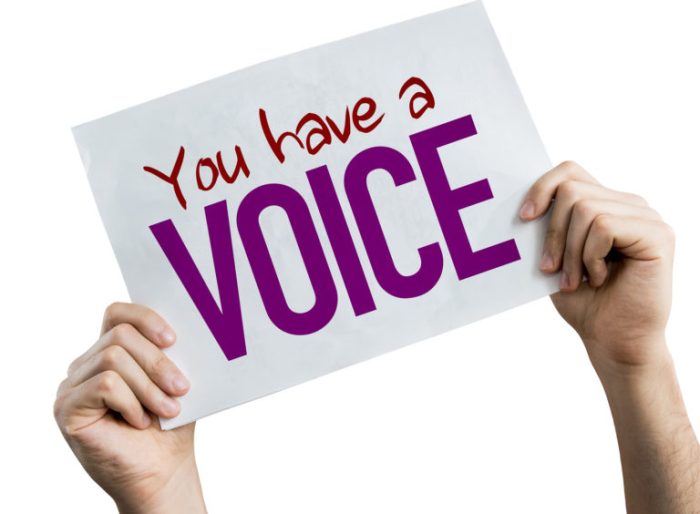In today’s world, where voices are constantly vying for attention, finding your own and using it effectively is more crucial than ever. From social media influencers to political activists, we’re bombarded with messages and opinions, making it hard to discern what truly resonates with us.
But amidst the noise, a powerful question arises: “I Have a Voice, but what do I say?” This question serves as the foundation for this exploration, where we’ll dive into the power of finding your voice, using it for good, and making a real difference in the world.
We’ll explore the strategies for discovering your unique voice, navigating the challenges of speaking up, and ultimately harnessing the power of your voice to create positive change. Think of it as a guide to becoming a modern-day superhero, armed with the power of words and the courage to speak your truth.
The Power of Voice

In today’s world, where information travels at lightning speed and opinions are constantly being formed, having a voice is more important than ever. It’s the ability to express yourself, to share your thoughts, and to make your presence known. Your voice is a powerful tool that can be used to inspire, educate, and create positive change.
The Significance of Having a Voice
In a world where social media platforms and news outlets dominate the flow of information, having a voice allows individuals to break through the noise and contribute their unique perspectives. Your voice can be used to advocate for causes you care about, challenge injustice, and inspire others to take action.
Examples of Individuals Who Have Used Their Voice for Positive Change
- Malala Yousafzai: This Pakistani activist used her voice to advocate for girls’ education, defying threats and violence to raise awareness about the importance of education for all. Her courage and determination have inspired millions worldwide.
- Greta Thunberg: This Swedish environmental activist has become a global voice for climate action, using her platform to call for urgent action against climate change. Her passionate speeches and unwavering commitment have sparked a worldwide movement.
- Martin Luther King Jr.: This American civil rights activist used his voice to fight for racial equality and justice, inspiring a generation with his powerful speeches and nonviolent resistance. His legacy continues to resonate today, reminding us of the power of words to bring about change.
Challenges and Obstacles to Finding Your Voice
Finding your voice can be a challenging journey, often fraught with self-doubt and fear.
Like Mary Lennox in The Secret Garden , we all have the power to bloom, to transform our own lives and the world around us. The garden, a symbol of hidden potential, reminds us that even in the darkest of times, growth and beauty are possible.
So, let your voice be heard, let your spirit flourish, and watch your own personal garden blossom.
- Fear of Judgment: Many individuals are hesitant to express their opinions or beliefs due to fear of being judged or ridiculed. This fear can stifle creativity and prevent people from sharing their unique perspectives.
- Lack of Confidence: Some individuals may lack the confidence to speak up, believing their voice is not important or that they don’t have anything valuable to contribute. This can be a result of past experiences or societal pressures that have led to a lack of self-belief.
Yo, “I Have a Voice” is all about speaking your truth, right? Like, finding your own style and owning it. That’s kind of what “Maybe Not Nothing or Emergence a collection of experimental poems revisited after two decades” is all about , too.
It’s like revisiting your old self and seeing how far you’ve come, but with a fresh perspective. It’s a reminder that even if you’ve been quiet for a while, you can always find your voice again, and it’ll be stronger than ever.
- Social and Cultural Barriers: Certain social and cultural norms can discourage individuals from expressing themselves freely. For example, in some cultures, women may be discouraged from speaking up in public or expressing dissenting opinions.
Finding Your Voice

Finding your voice is like discovering your own unique superpower – it’s the ability to express yourself authentically and connect with others on a deeper level. It’s about understanding who you are, what you believe in, and how you want to make your mark on the world.
Understanding Your Values and Beliefs
Your values and beliefs are the foundation of your voice. They shape your perspectives, influence your decisions, and guide your actions. They are like the compass that points you in the right direction.
Yo, you know what they say? “I Have a Voice,” and it’s time to make it heard! So, if you’re ready to unleash your inner rockstar and let your voice soar, Download And Listen Here to some tunes that’ll give you the confidence to belt it out! It’s all about finding your voice, and these tracks will help you find your groove.
- Reflect on your experiences:Think about the moments in your life that have shaped you, the challenges you’ve overcome, and the values you hold dear. What are your core beliefs? What matters most to you? What are your passions and interests?
- Explore your passions:What gets you excited? What do you enjoy doing? What are you naturally good at? These are clues to your unique voice.
- Identify your strengths and weaknesses:What are you good at? What do you struggle with? Knowing your strengths can help you leverage them, while acknowledging your weaknesses can help you grow and develop.
Using Your Voice Effectively
Once you’ve discovered your voice, it’s important to learn how to use it effectively in different situations. Here are some tips:
- Be confident:Believe in yourself and your message. Speak with conviction and clarity.
- Be clear and concise:Get to the point and avoid rambling. Use simple language that everyone can understand.
- Be respectful:Even when you disagree with someone, be respectful of their opinions. Listen attentively and try to understand their perspective.
- Be authentic:Don’t try to be someone you’re not. Let your true personality shine through.
Developing Your Voice
Developing your voice is an ongoing process. It’s about constantly learning, growing, and evolving. Here are some strategies:
- Read widely:Expose yourself to different perspectives and writing styles. Pay attention to the authors whose voices resonate with you.
- Write regularly:Practice writing in different formats, such as essays, poems, stories, or blog posts. The more you write, the more comfortable you’ll become with expressing yourself.
- Seek feedback:Share your work with trusted friends, family, or mentors and ask for constructive feedback. This can help you identify areas for improvement.
- Be open to new experiences:Try new things, meet new people, and challenge yourself. These experiences will enrich your perspective and give you new things to talk about.
Using Your Voice for Good
Your voice is a powerful tool. It can be used to inspire, to educate, to motivate, and to create change. When you use your voice for good, you can make a real difference in the world.
Campaign Design: Using Your Voice to Address a Social Issue
Imagine a world where everyone has access to clean water. This is a powerful and achievable goal, and it’s one that can be addressed through a campaign using your voice. You can launch a campaign to raise awareness about the global water crisis and encourage people to take action.
This could involve using social media to share facts and stories, organizing events to educate the public, and advocating for policy changes that support clean water initiatives.
Ethical Considerations of Using Your Voice for Advocacy
It’s important to consider the ethical implications of using your voice for advocacy. You should always strive to be truthful, respectful, and responsible in your communication. Avoid spreading misinformation or engaging in harmful rhetoric. It’s also important to be aware of the potential for your voice to be misused or misinterpreted.
Be mindful of the impact your words can have on others, and always strive to use your voice for good.
Ways Individuals Can Use Their Voice to Make a Difference
There are many ways individuals can use their voice to make a difference in their communities. Here are a few examples:
- Volunteer:Give your time and skills to organizations working on issues you care about.
- Donate:Support organizations that are working to make a positive impact.
- Educate Yourself:Stay informed about the issues that matter to you.
- Speak Up:Share your opinions and experiences with others.
- Vote:Use your voice to choose leaders who will represent your values.
- Advocate:Contact your elected officials and express your views on important issues.
Book Review

Finding your voice is a journey that many of us embark on, and sometimes, a little guidance from a book can make all the difference. One book that truly resonated with me on this theme is “The Gifts of Imperfection” by Brené Brown.
This book isn’t just about finding your voice, it’s about embracing your whole self, flaws and all, and using that authenticity to connect with others.
Summary of the Book
“The Gifts of Imperfection” is a powerful and insightful exploration of vulnerability, courage, and the power of authenticity. Brown, a research professor, shares her personal journey and the results of her groundbreaking research on vulnerability, shame, and courage. She argues that embracing our imperfections and vulnerabilities is not a weakness, but a strength.
It’s through vulnerability that we can build meaningful connections, live authentically, and find our true voice. The book is structured around ten guideposts for wholehearted living, each addressing a different aspect of vulnerability and authenticity. Some of the key themes include:
- Cultivating Self-Compassion: Brown emphasizes the importance of treating ourselves with the same kindness and understanding we would offer to a loved one. This means recognizing our imperfections without judgment and practicing self-forgiveness.
- Letting Go of Perfectionism: Brown challenges the societal pressure to be perfect and encourages us to embrace our imperfections as part of what makes us unique. She argues that striving for perfection can lead to anxiety, shame, and ultimately, a disconnect from our true selves.
- Embracing Vulnerability: This is the core message of the book. Brown argues that vulnerability is not weakness, but a source of strength and connection. It’s through vulnerability that we can build trust, create intimacy, and experience true joy.
- Practicing Gratitude: Brown encourages readers to cultivate a sense of gratitude for the good things in their lives. This practice can help shift our focus from what we lack to what we have, fostering a sense of contentment and appreciation.
- Cultivating Joy: Brown reminds us that joy is not something that happens to us, but something we choose to experience. She encourages readers to identify and embrace the sources of joy in their lives, even in the midst of challenges.
Author’s Message and Impact
Brown’s message is clear: authenticity is key to living a fulfilling life. She encourages readers to embrace their imperfections, be vulnerable, and connect with others on a deeper level. The book’s impact is profound, providing readers with a framework for understanding themselves and their relationships with others.
It’s a message of hope and empowerment, reminding us that we are not alone in our struggles and that vulnerability is a source of strength.
Strengths and Weaknesses
“The Gifts of Imperfection” is a powerful and inspiring book with many strengths:
- Research-Based: Brown’s work is grounded in extensive research and data, making her arguments compelling and credible.
- Personal and Relatable: Brown shares her own personal experiences and struggles, making the book relatable and accessible to readers.
- Practical and Actionable: The book provides concrete steps and strategies that readers can implement in their own lives.
- Empowering: Brown’s message is one of empowerment, reminding readers that they have the power to create a more fulfilling and authentic life.
While the book is generally well-received, there are a few potential weaknesses:
- Overly Simplistic at Times: Some readers may find that Brown’s approach to vulnerability is overly simplistic, particularly in the context of complex societal issues.
- Repetitive: Some of the key themes are repeated throughout the book, which can feel repetitive for some readers.
Recommendation
“The Gifts of Imperfection” is highly recommended for anyone who is seeking to live a more authentic and fulfilling life. It’s a valuable resource for individuals who are struggling with self-doubt, perfectionism, or a lack of connection. This book can help you embrace your imperfections, cultivate self-compassion, and find your true voice.
You know that feeling when you’re finally ready to speak your mind, like you’ve got a whole lot to say? That’s what “I Have a Voice” is all about. It’s about owning your story, even if it’s a wild ride like the one in 32 Jobs & No Gold Watch , a blog post that’s totally relatable for anyone who’s been on a journey with more twists and turns than a rollercoaster.
But no matter what your path looks like, “I Have a Voice” reminds us that every single person has something unique to share, and that’s worth celebrating.
Closure

Ultimately, finding your voice isn’t just about shouting from the rooftops. It’s about understanding your values, connecting with your inner self, and using your voice to build bridges, inspire change, and leave a lasting impact on the world. It’s about recognizing that even the smallest voice can make a difference.
So, what are you waiting for? Embrace your voice, let it be heard, and join the chorus of changemakers who are making the world a better place, one word at a time.
Common Queries
What if I’m afraid to speak up?
It’s completely normal to feel scared. Start small! Practice expressing yourself in safe spaces, like with friends or family. Gradually work your way up to sharing your thoughts in larger settings. Remember, you’re not alone!
How can I use my voice to help others?
There are countless ways to use your voice for good! Volunteer for a cause you care about, write letters to your elected officials, or start a social media campaign to raise awareness about an issue. Every action, no matter how small, can make a difference.

